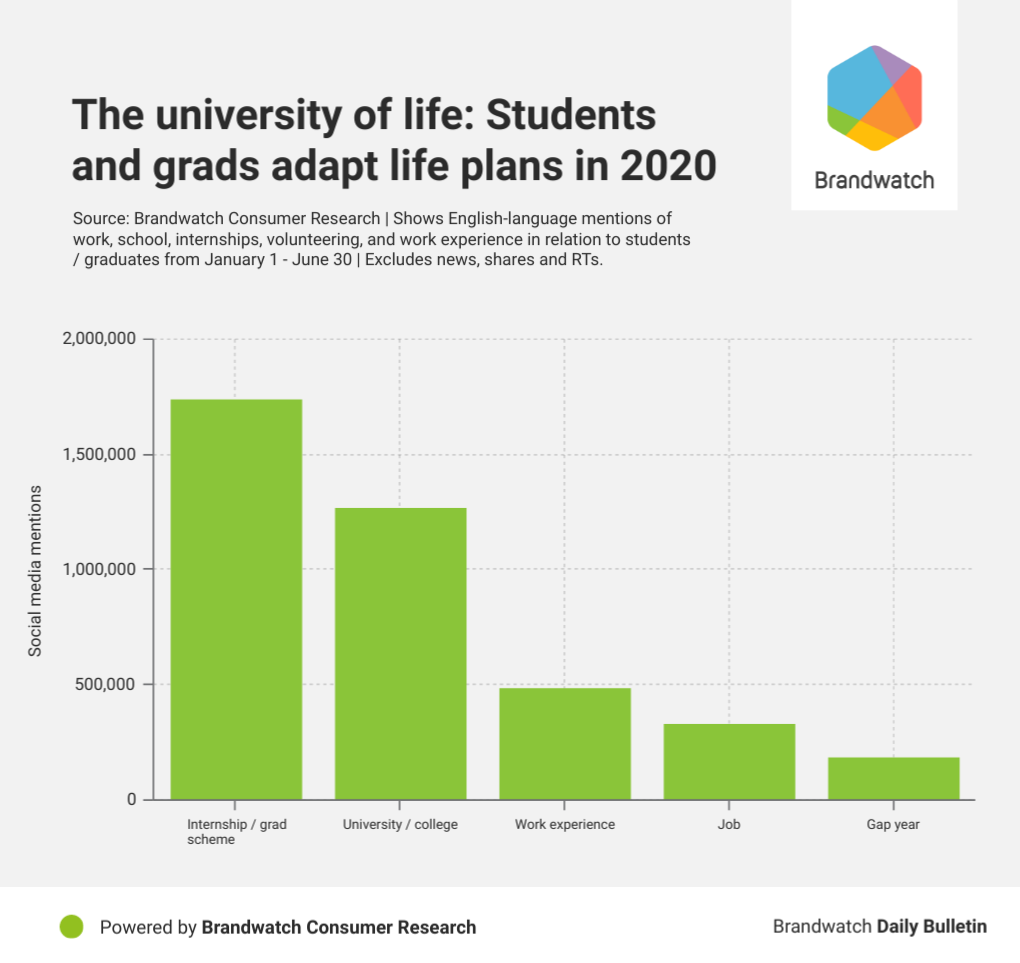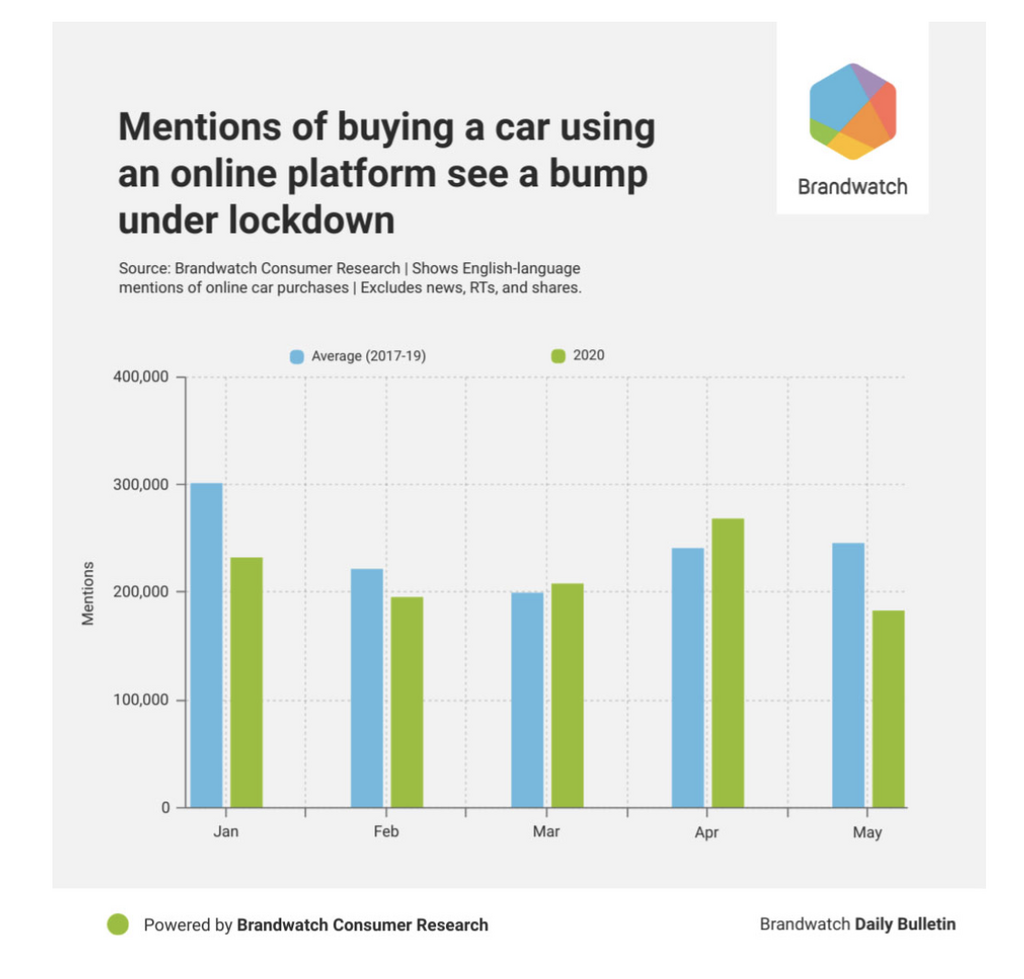For many who had big life plans for 2020, it’s been a gut-wrenching year.
To understand more about how life events are changing under the pandemic, we looked to our Consumer Research platform.
From car purchases, to home buys, to going to university, to walking down the aisle, consumers are thinking differently, especially when it comes to making big decisions with lots at stake.
The university of hard knocks
To understand what youngsters are planning, we searched for English-language online conversations around gap years, internships, jobs, further education, and work experience in relation to grads and students.
Over the last six months, university and college mentions formed only 32% of the overall conversation we tracked about young people’s future choices.
College education is being criticized for a number of reasons, including:
- The high fees which only cover online classes (108k mentions)
- There potentially being no real campus experience (67k mentions)
- The caps on student numbers (44k)
So what other options are being discussed?
In the last four months, mentions of internships and graduate schemes increased 60% compared to the four months prior. This indicates that, while these options were already considered important, more people are thinking about them now and the application process could become more competitive as a result.
Popular topics in the internship/graduate scheme conversation included personal stories of getting internships (169k mentions), people talking about virtual internships (112k mentions), and postponed schemes (59k mentions).
Discussion about work experience for students and graduates increased 41% in the last four months compared to the four months prior. This conversation is focused on making up for a lack of internships, education, and paying jobs, and the main driver was people complaining about a lack of opportunity.
In the last four months, gap year conversation in relation to graduates increased 30% compared to the four months prior. But grads and students aren’t packing their bags to go on lengthy vacations – instead, they’re talking about using their time off to volunteer (5k mentions) and build experience in their field (25k mentions).
Meanwhile, mentions about jobs post-graduation are depressingly low, and the tone is apprehensive.
A whole year of students and would-be college goers are re-evaluating their prospects and, given the state of jobs and the cost of further education, it’s understandable that alternative paths are such hot topics.
The wedding bells are quiet
Lockdown meant happy couples could no longer tie the knot surrounded by family and friends.
In fact, our Consumer Research platform found 217k mentions of people cancelling or postponing their big day since March. Perhaps discouragingly, cancellations had more mentions (116k) than postponements (109k mentions).
Wedding conversions in general over the last four months were down by 7% on average — particularly interesting because May usually kicks off ‘wedding season’.
Unfortunately it hasn’t been easy for couples to claim their money back, even if they had wedding insurance. 48k took to social to voice their complaints from March to June.
That said, thousands of couples have embraced technology during the pandemic, and rather than cancelling they’ve opted for virtual ceremonies. There were 488k mentions of tying the knot online via platforms like Zoom in the last four months, proving that, even in a pandemic, romance is alive and well.
Celebrate good times
There’s nothing quite like a birthday or special anniversary on your calendar to pick up a dull week. In a pandemic, these events look slightly different but they’re equally important.
In the last three months mentions of anniversaries and birthdays on social have increased by 30% compared to the three months prior. Instead of an in-person happy birthday, we’re now receiving them online.
Virtual celebrations were top of the agenda, with 192k mentions, while pub quizzes organized for birthdays raked up 24k mentions.
Celebrants have really taken advantage of online platforms to bring everyone together. It will be interesting to see if these online celebrations continue, especially for friends separated by long distances, when they may not have bothered to connect previously.
Car purchases are down
Buying or trading a car isn’t just about kicking some tires or the new car smell. It’s about taking that car out on the open road and feeling like you’ve found the one. It’s always a big decision.
During the peak-lockdown months of March and April, English-language mentions of buying a car online or via an app were 8% higher than average.
One of the most positive things about this conversation was the no-quibble guarantee offered by many online dealers (16k consumers spoke about how they loved this).
However, buying cars online won’t necessarily be revving engines throughout 2020.
Conversation about buying online fell again in May (by 25%) as the UK and some states in the US loosened lockdown measures and allowed showrooms to reopen. This indicates that, for many, online purchases were simply a temporary means to an end.
How might car sales fare later in the year?
In our recent report on whether Covid-19 will change consumer behavior in the long term, we found that only 58% of survey respondents who planned to buy a car pre-outbreak still intend to in 2020. This signals that the pandemic could potentially have a huge impact on the already troubled automotive industry.
The last few years for the sector have been turbulent and, sadly, we can expect that theme to step up a gear in 2020 because of the Covid-19 crisis. That said, there are some very encouraging signs that the industry could bounce back.
According to Car Advice Australia, Aussies bought 110,000 news cars in June 2020 — the strongest result since June 2019 — as the nation emerged from lockdown, thanks to a federal government incentive.
Home buying conversation rises during lockdown
A recent Qriously survey found that 63% of people who had planned to buy a house (pre-outbreak) in 2020 still plan to do so.
This piqued our interest and we wanted to know why consumers were so optimistic about their house buying plans considering the current circumstances. We discovered that people are still discussing buying homes on social media despite the crisis and bleak forecasts.
In fact, mentions of buying a house were up in 2020 compared to the same period in 2019.
We found mentions of buying a home were driven by falling house prices and relocation. With more companies taking on remote working policies, employees are beginning to think about living wherever they like.
From March to May, family was a big driver of conversation with 165k people pondering moving home. Meanwhile, 127k mentions were focused on moving for jobs, while 105k mentions referenced wanting a bit more space.
We also found much of the conversation about buying a home was driven by avoiding any future coronavirus outbreaks. For example, there were 23k mentions asking for advice and opinions on moving out of New York, specifically to avoid any future flare-ups in the densely populated city.
Moving on
To quote Jeff Goldblum’s infamous Jurassic Park line, “life finds a way”. And we’ve learned that this still rings true, even in a Covid-19 world – we’re changing everything so it works for us. Perhaps the largest indication of this is people altering their big life plans and events around the crisis.
Much of this analysis originated in our Daily Covid-19 Data Bulletin. Sign up here to get the latest updates straight to your inbox.





